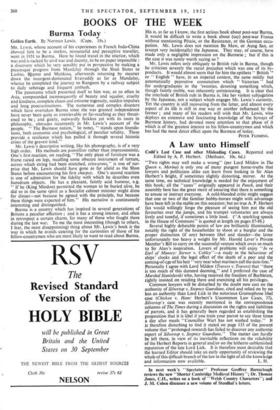BOOKS OF THE WEEK
Burma Today
Golden Earth. By Norman Lewis. (Cape. 18s.) MR. LEWIS, whose account of his experiences in French Indo-China showed him to be a tireless, resourceful and perceptive traveller, went in 1951 to Burma. Here he found travel in the interior, which was and is racked by civil war and dacoity, to be on paper impossible : a discovery which he very sensibly put in perspective by making a picaresque progress from Mandalay through the Shan States to Lashio, Bliamo and Myitkina, afterwards returning by steamer down the insurgent-dominated Irrawaddy as far as Mandalay, whence he completed the journey to Rangoon by a railway subject to daily sabotage and frequent ambush. The panorama which presented itself to him was, as so often in Asia, compounded inconsequently of beauty and squalor, cruelty and kindness, complete chaos and extreme ingenuity, sudden impulses and long procrastinations. The numerous and complex disasters which have overtaken Burma since she was granted independence have never been quite as irretrievable or far-reaching as they threat- ened to be ; and gaiety, outwardly feckless yet with its roots in philosophy, obtrudes recurrently in Mr. Lewis's account of the people. " The Burmese nation," he notes, " stands upon founda- tions, both economic and psychological, of peculiar solidity. These provide a resilience which has pulled it through several historic crises of the gravest kind." Mr. Lewis's descriptive writing, like his photography, is of a very high order. His methods are pointilliste rather than impressionistic. One's first reaction, on reading, "The only piece of furniture was a frame raised on legs, recalling some obscure instrument of torture, across which string had been stretched, criss-cross," is one of sur- prise that Mr. Lewis should have gone as far afield as the Shan States before encountering his first charpoy. One's second reaction is one of admiration for the fidelity with which he describes even humdrum objects. He has a pleasant, faintly acid humour, e.g. " If he (King Mindon) permitted the woman to be buried alive, he did so in the same spirit as a Socialist cabinet minister might dress for dinner—not because he agreed with the principle, but because these things were expected of him." His narrative is continuously interesting and distinguished. Burma is a country which has inspired in several generations of Britons a peculiar affection ; and it has a strong interest, and often in retrospect a certain charm, for many of those who fought there during the last war. To me the most interesting (though to others, I fear, the most disappointing) thing about Mr. Lewis's book is the way in which he avoids catering for the curiosities of those of his fellow-countrymen who are most likely to want to read about Burma. His is, as far as 1 know, the first serious book about post-war Burma. It would be difficult to write a book about (say) post-war France without mentioning Main, or the Resistance, or the German occu- pation. Mr. Lewis does not mention Ba Maw, or Aung San, or (except very incidentally) the Japanese. They may, of course, have made only a negligible impression on the Burmese ; but if this is the case it was surely worth saying so ?
Mr. Lewis refers only obliquely to British rule in Burma, though he criticises severely the racial prejudice which was one of its by- products. It would almost seem that for him the epithets " British " or " English " have, in an imperial context, the same mildly but automatically pejorative connotation which " Victorian " had for undergraduates in the 'twenties, denoting something which, though faintly risible, was inherently uninteresting. It is clear that the interlude of British rule in Burma is, like her violent subjugation by the Japanese, not a subject which engages Mr. Lewis's curiosity. Yet the country is still recovering from the latter, and almost every aspect of its life is still in one way or another influenced by the former ; and many of his readers will wish that. Mr. Lewis, who deploys an extensive and fascinating knowledge of the byways of Burmese history, had devoted more attention to that phase of it which is of the greatest interest to his fellow-countrymen and which has had the most direct effect upon the Burmese of today.
PETER FLEMING.


































 Previous page
Previous page